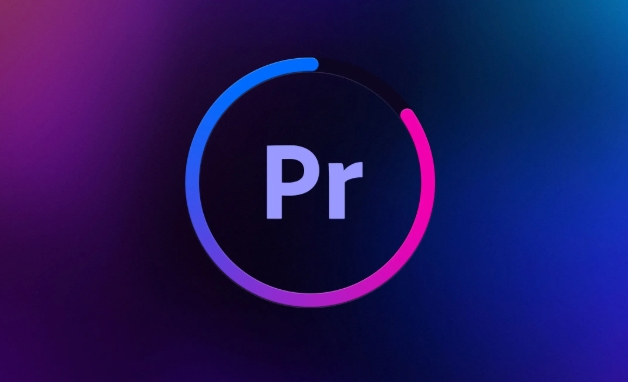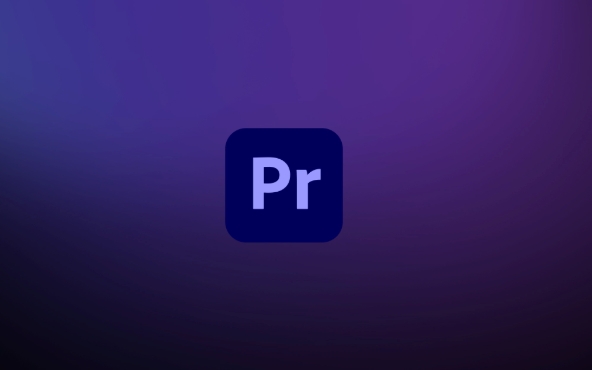how to conform a sequence to a different frame rate in Premiere Pro
Jul 21, 2025 am 12:12 AMThe method to adjust the sequence frame rate in Premiere Pro is: right-click the sequence and select "Sequence Settings" and modify the frame rate value, but you need to note that the frame rate of the original material remains unchanged and the playback speed will change. To ensure smooth picture, "Frame Resampling" or use "Optical Flow Method" to generate intermediate frames. If there is lag or audio and video out of synchronization, you can check the frame resampling settings, select the export format that supports high frame rates such as H.264/H.265, and manually align the audio rhythm. In addition, the proxy editing process also needs to synchronize the update of frame rate settings to avoid preview issues.

Adjusting the sequence frame rate is actually a very common operation in Premiere Pro, especially when processing materials from different sources or exporting videos for specific platforms. It is not difficult to directly change the frame rate, but to ensure that the picture is smooth and the timeline does not deform, you need to pay attention to some details.

Confirm your needs before changing the frame rate
Not all cases are suitable for direct frame rate change. If you just want to play a video from 24fps to 30fps, it may be to match the overall rhythm of the project; if it is optimized for platforms like YouTube or TikTok, you may also need to consider whether the export settings support the frame rate you want.

- If the frame rate of the material itself is incorrect, it is recommended to check the frame rate settings in the "Explanation Material" when importing first.
- If the frame rate of the entire project needs to be changed, you can directly modify the sequence settings.
- Note: Some formats do not support certain frame rates (for example, H.264 only supports 30fps on some devices), and it is also important to confirm the output format limitations in advance.
Methods to modify sequence frame rate
This operation looks simple, but if you are not careful, the screen will stutter or the audio and video will be out of sync. Here are the correct ways to do it:
- Right-click the sequence in the project panel and select "Sequence Settings".
- Find the "Frame Rate" option in the pop-up window and change it to the value you need, such as changing from 24fps to 30fps.
- After clicking OK, the original clips on the timeline will be automatically remaped to the new frame rate.
Note : This step will not change the frame rate of the original material, it will only change the playback speed and display frame rate. If you want the actual frame number to change as well, such as slow motion or fast playback effects, you need to enable "frame resampling" or use "optical flow method" to generate intermediate frames.

What should I do if I encounter lag or the audio and video is out of sync?
When you adjust the frame rate, you may find that the picture jumps significantly, or the audio cannot keep up with the rhythm. At this time you can:
- Check whether the "Frame Resampling" of the clip is on (right-click the clip → Speed/Duration → Enable "Frame Resampling").
- Select a format that supports high frame rates when exporting media, such as H.264 or H.265 in MP4.
- If you have audio problems, you can try to lengthen or shorten the audio clips individually and align the rhythm manually.
If you use the proxy editing process, don't forget to update the frame rate in the proxy settings, otherwise there will be problems during previewing.
Basically that's it. It may be simple to say that changing the frame rate is smooth and not stuttering, it depends on how you adjust it with the editing method and export settings.
The above is the detailed content of how to conform a sequence to a different frame rate in Premiere Pro. For more information, please follow other related articles on the PHP Chinese website!

Hot AI Tools

Undress AI Tool
Undress images for free

Undresser.AI Undress
AI-powered app for creating realistic nude photos

AI Clothes Remover
Online AI tool for removing clothes from photos.

Clothoff.io
AI clothes remover

Video Face Swap
Swap faces in any video effortlessly with our completely free AI face swap tool!

Hot Article

Hot Tools

Notepad++7.3.1
Easy-to-use and free code editor

SublimeText3 Chinese version
Chinese version, very easy to use

Zend Studio 13.0.1
Powerful PHP integrated development environment

Dreamweaver CS6
Visual web development tools

SublimeText3 Mac version
God-level code editing software (SublimeText3)

Hot Topics
 how to make text appear one letter at a time in Premiere Pro
Jul 08, 2025 am 12:02 AM
how to make text appear one letter at a time in Premiere Pro
Jul 08, 2025 am 12:02 AM
To display text letter by letter, use PremierePro’s built-in “Typewriter” animation preset or manually adjust the opacity or zoom of each character. 1. Use presets such as "Typewriter-Reveal" in the "EssentialGraphics" panel to directly apply the verbatim effect; 2. Enable character-by-character animation through the "EssentialGraphics panel" and select Opacity or Scale for customization; 3. Set Start and EndOffset to control the animation rhythm and combine keyframes to achieve dynamic changes; 4. You can adjust the offset, add blur or color change to enhance the effect. It is recommended that each letter lasts 0.1-0.2 seconds and is suitable for phrases rather than long paragraphs.
 how to fix red frames in Premiere Pro
Jul 07, 2025 am 12:16 AM
how to fix red frames in Premiere Pro
Jul 07, 2025 am 12:16 AM
The red box appears in PremierePro because the preview file is not generated or the material path is incorrect. Common reasons include just imported projects, material path changes, insufficient cache space, or failed proxy files loading. Solution: 1. Wait for automatic cache generation; 2. Manually generate preview rendering timeline; 3. Check and relink missing materials; 4. Clean and rebuild media cache. When using proxy clips, you should confirm that the proxy files are correctly associated and appropriately reduce the playback resolution to improve preview fluency.
 how to rotate video in Premiere Pro
Jul 04, 2025 am 01:33 AM
how to rotate video in Premiere Pro
Jul 04, 2025 am 01:33 AM
There are three ways to rotate videos in PremierePro. 1. Use the "Motion" option in the "Effect Control" to accurately adjust the rotation angle, which is suitable for fine operation; 2. Use the "Create Sequence from Clip" function to automatically correct the vertical video direction of the mobile phone, saving time and effort; 3. Use "Crop" and "Zoom" to adjust the screen to fill the screen and avoid black edges to ensure complete output quality.
 how to apply an effect to multiple clips in Premiere Pro
Jul 05, 2025 am 12:22 AM
how to apply an effect to multiple clips in Premiere Pro
Jul 05, 2025 am 12:22 AM
There are three ways to quickly add the same effect to multiple clips in PremierePro: 1. Use the "EffectChainer" tool to first apply the effect to one clip, and then click other clips one by one through the chain icon in the effect panel to apply it in batches; 2. By copying and pasting attributes, right-click the first clip with added effects in the timeline to select copy, then select other clips to right-click to select paste attributes, and only select video or audio effects to paste; 3. Use the adjustment layer to process the video effect, create a new adjustment layer and place it above the target clip, and drag the effect to the adjustment layer to affect all clips below it. The above methods can significantly improve work efficiency and are suitable for the needs of different scenarios.
 how to fade audio in Premiere Pro
Jul 05, 2025 am 12:50 AM
how to fade audio in Premiere Pro
Jul 05, 2025 am 12:50 AM
Adding a fade effect to audio in PremierePro can be achieved in three ways: 1. Use audio transition effects such as "Constant Gain" or "Exponential Fade" and drag directly to the beginning of the audio clip; 2. Manually add volume keyframes in the "Effect Controls" panel, and control fade speed and nature by adjusting the keyframe position and curve; 3. Use the "Trail Mixer" to drag the volume slider in real time to record the operation track, which is suitable for unified management of multi-track audio. Each method has its own advantages. Newbie can choose to quickly achieve the transition effect, advanced users are suitable for manual adjustment or use the track mixer to obtain more refined control. Finally, it is recommended that preview ensures that the audio transition is natural and smooth.
 how to normalize audio in Premiere Pro
Jul 04, 2025 am 12:16 AM
how to normalize audio in Premiere Pro
Jul 04, 2025 am 12:16 AM
NormalizingaudioinPremiereProadjuststheloudestpeakinacliptoatargetlevel,balancingvolumeacrossclips.1.Right-clickaclipandchoose“AudioGain…”2.Select“NormalizeMaxPeakto”andsetatargetlike-1dBor-3dB.3.ClickOKtoapply;thisscaleseachclip’svolumeuniformly.Itw
 how to create a cinematic look in Premiere Pro
Jul 06, 2025 am 12:07 AM
how to create a cinematic look in Premiere Pro
Jul 06, 2025 am 12:07 AM
To bring up a movie-like picture in PremierePro, the key is to adjust the basics and follow the following steps: 1. Use the LumetriColor panel for basic corrections and creative color grading to avoid directly applying presets; 2. Add FilmGrain effect to improve texture but not excessively; 3. Control the details of highlights and shadows, and combine local adjustments to enhance levels; 4. Set appropriate output parameters such as H.264 or ProRes, 10bit color depth to preserve the color grading effect.
 how to make a video look like old film in Premiere Pro
Jul 11, 2025 am 12:04 AM
how to make a video look like old film in Premiere Pro
Jul 11, 2025 am 12:04 AM
If you want the video to present the old movie effect in PremierePro, the core is to adjust color, add noise, simulate film scratches and adjust the frame rate appropriately. 1. Adjust the color style: Use the LumetriColor panel to reduce saturation, increase warm tones, or apply "antique" presets and fine-tune according to the picture; 2. Add particles and scratches: Add appropriate amount of particles through plug-ins or built-in effects, superimpose transparent scratch layers and select the appropriate blending mode; 3. Adjust frame rate and playback speed: Export high frame rate materials to lower frame rates or use frame fusion to simulate the playback rhythm of old movies; 4. Add black edges and slight jitter: Use a mask layer to add black edges, and retain slight shaking through WarpStabilizerVFX to enhance the sense of reality. Each step requires







